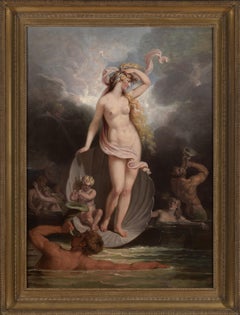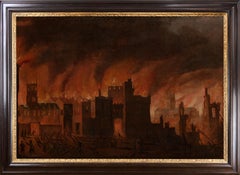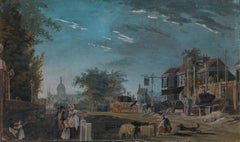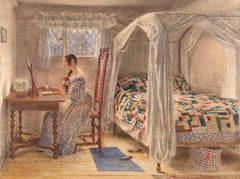Want more images or videos?
Request additional images or videos from the seller
1 of 8
George Dawe19th century portrait painted in St Petersburg in 18191819
1819
Price:$67,999.18
$217,597.39List Price
About the Item
- Creator:George Dawe (1781 - 1829, English)
- Creation Year:1819
- Dimensions:Height: 26 in (66.04 cm)Width: 22.5 in (57.15 cm)
- Medium:
- Movement & Style:
- Period:
- Condition:In excellent condition, the canvas is unlined. In a fine gilt-wood frame.
- Gallery Location:London, GB
- Reference Number:1stDibs: LU150727720142
About the Seller
5.0
Recognized Seller
These prestigious sellers are industry leaders and represent the highest echelon for item quality and design.
1stDibs seller since 2021
5 sales on 1stDibs
Authenticity Guarantee
In the unlikely event there’s an issue with an item’s authenticity, contact us within 1 year for a full refund. DetailsMoney-Back Guarantee
If your item is not as described, is damaged in transit, or does not arrive, contact us within 7 days for a full refund. Details24-Hour Cancellation
You have a 24-hour grace period in which to reconsider your purchase, with no questions asked.Vetted Professional Sellers
Our world-class sellers must adhere to strict standards for service and quality, maintaining the integrity of our listings.Price-Match Guarantee
If you find that a seller listed the same item for a lower price elsewhere, we’ll match it.Trusted Global Delivery
Our best-in-class carrier network provides specialized shipping options worldwide, including custom delivery.You May Also Like
18th Century Italian Portrait Credited to Maria Giovanna Battista Clementi
Located in Roma, IT
18th Century Italian Portrait Credited to Maria Giovanna Battista Clementi
The painting probably depicts a young nobleman of Savoy court ...
Category
Mid-18th Century Old Masters Portrait Paintings
Materials
Oil, Canvas
$5,321
H 19.89 in W 15.95 in D 1.97 in
Portrait of Lady, Barbara Herbert, Countess of Pembroke c.1708, Large Painting
Located in London, GB
Portrait of Barbara Herbert, Countess of Pembroke c.1708
Charles d’Agar (1669-1723)
This magnificent large-scale portrait, presented by Titan Fine Art, depicts the British court of...
Category
17th Century Old Masters Portrait Paintings
Materials
Cotton Canvas, Oil
$17,529
H 49.61 in W 46.86 in D 2.76 in
Portrait of a Lady in Green Dress & Pearl Jewellery c.1660 Painting John Wright
By John Michael Wright
Located in London, GB
In this exquisite work, painted around the time of the Great Fire of London in 1666, a beautiful young woman is wearing a green dress over a white chemise and a russet-coloured scarf...
Category
17th Century Old Masters Portrait Paintings
Materials
Canvas, Oil
$13,395
H 39.38 in W 33.47 in D 3.15 in
18th century Portrait of a young girl, Miss Cator in a landscape, white dress
By John Russell
Located in Woodbury, CT
Portrait of a young British Girl, in her white dress with Pink Sash.
Choosing to acquire an 18th-century portrait of a young girl by English artist John Russell is an opportunity to...
Category
1780s Old Masters Portrait Paintings
Materials
Canvas, Oil
$7,960 Sale Price
20% Off
Free Shipping
H 21 in W 18 in
Portrait of William Chiffinch
By John Riley
Located in London, GB
John Riley
1646 – 1691
Portrait of William Chiffinch (c.1602-88)
Oil on canvas
Image size: 30 x 25 inches
Original frame
Another version of this can be found in the Dulwich Pictur...
Category
1680s Old Masters Portrait Paintings
Materials
Oil, Canvas
Portrait of Lady Caroline Price
By George Romney
Located in Miami, FL
DESCRIPTION: Perhaps the best Romney in private hands. If Vogue Magazine existed in the late 18th century, this image of Lady Caroline Price would be ...
Category
1970s Old Masters Portrait Paintings
Materials
Oil, Canvas
French School, 17th Century, 'Portrait of the Marquise de Grugieres', oil canvas
Located in Petworth, West Sussex
French school, 17th Century
Portrait of the Marquise de Grugieres
Oil on canvas
26.1/4 x 21.5/8 in. (66.7 x 54.8 cm.)
In a gilded composite frame, later production (possible early 1...
Category
17th Century Old Masters Portrait Paintings
Materials
Canvas, Oil
$6,138
H 26.25 in W 21.63 in D 1 in
Old Master portrait of a lady musician by the master or portraiture
Located in Petworth, West Sussex
Attributed to Pierre Paul Prud’hon (French, 1758-1823)
'La belle musicienne'
Oil on canvas, oval
Signed ‘P. P. Prudon’ (lower left)
28.3/4 x 23.1/2 in. (73 x 59.5 cm.)
Pierre Paul Prud'hon is considered a prime example of early French Romanticism. He was born as the seventh and last child of a master tailor. At the age of 16 he was a pupil of the painter and sculptor Francois Devosge. After finishing his studies he moved to Paris, where he first worked for an engraver and became friends with the Baron of Joursanvault, who became his patron. He also made a friendship with the "incorruptible", the politician and revolutionary Maximilien de Robespierre. Despite important friendships and the care of some cardinals, Prud'hon plunges into loneliness and melancholy. He has a good reputation and produces allegorical paintings, but his attachment to Robespierre forces him to leave the French capital. He now lives in the Free County of Burgundy, where he makes portraits and illustrations for Pierre Didot, the owner of the printing house. After a few years he moved back to Paris and his career received a new impetus.
In the Louvre, Prud'hon is provided with a studio in which he paints "La sagesse et la vérité descendant sur la terre" (Wisdom and Truth descend to earth) for one year, as well as some ceilings of the Louvre. The government assigns him a studio in the Sorbonne, where his wife Jeanne, whom he married at the age of 19, comes looking for him. To escape her, he asks the museum director for protection. In 1808 he wrote "La justice et la vengeance divine poursuivant le crime" (Justice and divine revenge pursue the crime). In the same year he is also named Knight of the Legion of Honour and is able to break with his grumpy wife once and for all. He soon reconnects with his student and painter of neoclassicism Constance Mayer. Pierre is commissioned to paint a portrait of the Empress and wife of Napoleon, Joséphine de Beauharnais, which can still be seen today in the Louvre. He also paints the small "Roi de Rome" (King of Rome). In 1816 the Academy of Fine Arts elected him a member, where he took over the armchair in the painting section of François-André Vincent.
A few years later his depressed wife commits suicide, and full of pain Prud'hon finishes her last work "Une famille malheureuse" (Engl. An Unhappy Family) and exhibits it. He himself dies soon afterwards and is buried in Paris.
Many renowned artists admire Prud'hon for his "clair-obscur", the chiaroscuro painting...
Category
18th Century Old Masters Portrait Paintings
Materials
Canvas, Oil
$20,399
H 28.75 in W 23.5 in D 1 in
GIRL WITH KITTEN- In the Manner of F.Ballavoine's - Italy Oil on canvas paint
By Giulio Di Sotto
Located in Napoli, IT
Girl with kitten - Giulio Di Sotto Italia 2008 - Oil on canvas cm. 60x50
Frame available on request from our workshop.
This painting is Giulio Di Sotto’s personal reinterpretation of the 19th century French painter Jules Frédéric Ballavoine...
Category
Early 2000s Old Masters Portrait Paintings
Materials
Canvas, Oil
$2,317
H 23.63 in W 19.69 in
COUNTRY GIRL- W.A.Bouguereau- Italian Portarit of young peasant Oil on canvas
By Pietro Colonna
Located in Napoli, IT
Country girl - Pietro Colonna Italia 2006 - Oil on canvas cm. 45x25
Gold gilded wooden frame available on request
The painting by Pietro Colonna is a free interpretation of the paint...
Category
Early 2000s Old Masters Portrait Paintings
Materials
Canvas, Oil
$2,364
H 17.72 in W 9.85 in
More From This Seller
View All18th century allegorical painting of The Triumph of Beauty
Located in London, GB
Exhibited:
London, Royal Academy, 1800, no. 93
What was happening in British history painting in around 1800? In recent discussions of the emergence of a British School of history painting following the foundation of the Royal Academy in 1768, this is a question which is rarely posed and one which is not easily answered. Examination of surviving Royal Academy exhibition catalogues reveals a profusion of artists’ names and titles, few of which remain immediately recognizable, whilst endeavours to explain the impact of exhibition culture on painting - such as the 2001 Courtauld show Art on the Line - have tended to focus on the first and second generation of Royal Academician, rather than young or aspiring artists in the early nineteenth century. This makes the discovery and identification of the work under discussion of exceptional importance in making sense of currents in English painting around 1800. Executed by Edward Dayes...
Category
18th Century Old Masters Figurative Paintings
Materials
Canvas, Oil
Early oil depicting the Great Fire of London
Located in London, GB
The Great Fire of London in September 1666 was one of the greatest disasters in the city’s history. The City, with its wooden houses crowded together in narrow streets, was a natural fire risk, and predictions that London would burn down became a shocking reality. The fire began in a bakery in Pudding Lane, an area near the Thames teeming with warehouses and shops full of flammable materials, such as timber, oil, coal, pitch and turpentine. Inevitably the fire spread rapidly from this area into the City. Our painting depicts the impact of the fire on those who were caught in it and creates a very dramatic impression of what the fire was like. Closer inspection reveals a scene of chaos and panic with people running out of the gates. It shows Cripplegate in the north of the City, with St Giles without Cripplegate to its left, in flames (on the site of the present day Barbican). The painting probably represents the fire on the night of Tuesday 4 September, when four-fifths of the City was burning at once, including St Paul's Cathedral. Old St Paul’s can be seen to the right of the canvas, the medieval church with its thick stone walls, was considered a place of safety, but the building was covered in wooden scaffolding as it was in the midst of being restored by the then little known architect, Christopher Wren and caught fire. Our painting seems to depict a specific moment on the Tuesday night when the lead on St Paul’s caught fire and, as the diarist John Evelyn described: ‘the stones of Paul’s flew like grenades, the melting lead running down the streets in a stream and the very pavements glowing with the firey redness, so as no horse, nor man, was able to tread on them.’
Although the loss of life was minimal, some accounts record only sixteen perished, the magnitude of the property loss was shocking – some four hundred and thirty acres, about eighty per cent of the City proper was destroyed, including over thirteen thousand houses, eighty-nine churches, and fifty-two Guild Halls. Thousands were homeless and financially ruined. The Great Fire, and the subsequent fire of 1676, which destroyed over six hundred houses south of the Thames, changed the appearance of London forever. The one constructive outcome of the Great Fire was that the plague, which had devastated the population of London since 1665, diminished greatly, due to the mass death of the plague-carrying rats in the blaze.
The fire was widely reported in eyewitness accounts, newspapers, letters and diaries. Samuel Pepys recorded climbing the steeple of Barking Church from which he viewed the destroyed City: ‘the saddest sight of desolation that I ever saw.’ There was an official enquiry into the causes of the fire, petitions to the King and Lord Mayor to rebuild, new legislation and building Acts. Naturally, the fire became a dramatic and extremely popular subject for painters and engravers. A group of works relatively closely related to the present picture have been traditionally ascribed to Jan Griffier...
Category
17th Century Old Masters Landscape Paintings
Materials
Oil, Canvas
18th century view of the Elephant and Castle in London
Located in London, GB
Collections:
With Martyn Gregory;
Judy Egerton, 1984, acquired from the above;
By descent to 2014.
Exhibited:
London, Martyn Gregory, Exhibition of English & Continental Watercolours, 1984, no. 94.
London, Lowell Libson...
Category
18th Century Old Masters Landscape Paintings
Materials
Gouache, Vellum
19th century watercolour of a Girl at her Dressing Table
By William Henry Hunt
Located in London, GB
Collections:
Muir Hetherington;
Sir John and Lady Witt, acquired 1974;
By descent to 2015.
Literature:
Tom Jones (ed.), William Henry Hunt 1790-1864, exh. cat., 1981, no. 145 (Girl in a bedroom);
John Witt, William Henry Hunt (1790-1864) Life and Work, London, 1982, no. 553, p. 194, colour pl. 16.
Exhibited:
Wolverhampton, Central Art Gallery, Preston, Harris Museum and Art Gallery and Hastings, Hastings Museum and Art Gallery, William Henry Hunt 1790-1864, 1981, no. 145 as Girl in a bedroom (Lent by Sir John & Lady Witt)
Framed dimensions: 20 x 20.75 inches
This unusually charming and well-preserved watercolour was painted by William Henry Hunt in around 1833. Almost certainly depicting his young wife, Sarah, possibly in the interior of her family home at Bramley in Hampshire. This work shows Hunt’s remarkable virtuosity as a watercolourist, Hunt, for example, articulates the profile of his young wife, by leaving a reserve of white paper to suggest the light modelling her features. Throughout the 1830s Hunt made a sequence of richly painted interior views of both domestic and agricultural spaces which pay scrupulous attention to detail.
Hunt was born in London, the son of a tin-plate worker and japanner. J. L. Roget recorded the observation of Hunt’s uncle: ‘nervy, little Billy Hunt… was always a poor cripple, and as he was fit for nothing, they made an artist of him.’ At the age of sixteen he was apprenticed to the landscape painter John Varley for seven years, moving to live with Varley at 18 Broad Street, Golden Square, London. There he made close friends with both John Linnell and William Mulready. Hunt worked at the ‘Monro Academy’, at 8 Adelphi Terrace, London, the house of Dr Thomas Monro, an enthusiastic patron of landscape watercolourists. Through Monro, Hunt was introduced to the 5th Earl of Essex...
Category
19th Century Old Masters Figurative Drawings and Watercolors
Materials
Watercolor, Pencil
18th century pastel portrait of Lady Augusta Corbett and her son, Stuart
By Daniel Gardner
Located in London, GB
Collections:
Commissioned by Andrew Corbett, husband of the sitter;
The Venerable Stuart Corbett;
Sir Stuart Corbett;
By descent to 2002;
Sotheby’s, London 21 March 2002, lot.104;
Lowell Libson...
Category
18th Century Old Masters Portrait Drawings and Watercolors
Materials
Pastel, Gouache
Regency portrait drawing of Arabella Graham-Clarke
By John Downman
Located in London, GB
Collections:
The sitter, and by descent;
Christie's, 19th March 1928, lot 6;
Private collection to 2019
Literature:
G.C. Williamson, John Downman, A.R.A., his Life and Works, Lon...
Category
Early 19th Century Old Masters Portrait Drawings and Watercolors
Materials
Pencil, Watercolor



